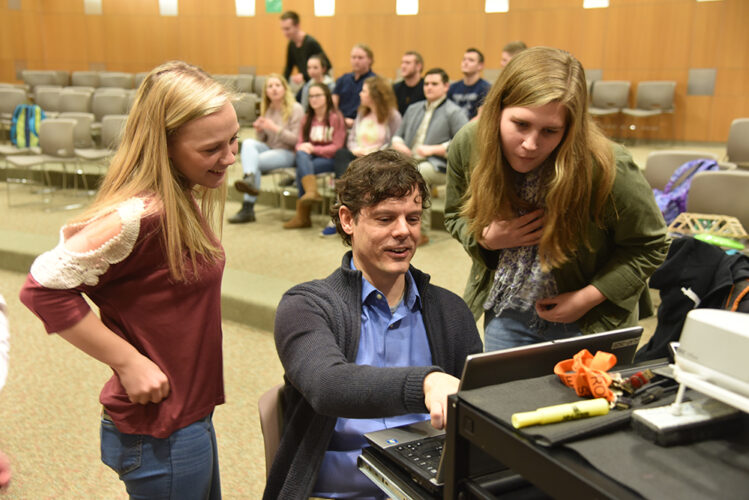Vast Majority of Pennsylvania Students Pass Newly Required Civics Test
PA among the latest states to mandate students take a citizenship exam. Several states don’t require that districts report their results

Get stories like this delivered straight to your inbox. Sign up for The 74 Newsletter
Some 84% of Pennsylvania students passed a newly required civics exam, part of a wave of similar mandates pushed hard by Republican lawmakers around the country, but one that hasn’t come with strict accountability.
Arizona was among the first states to adopt such a measure in 2015. Pennsylvania’s test, signed into law by the governor in 2018, took effect two years later amid a flurry of conservative-led education initiatives, many aimed at curtailing classroom discussions about the history of racism in America.
While some states allow schools to develop their own assessments around civics, others use the citizenship test administered to new immigrants. Several states do not require schools to report their results, and the mandate often carries with it no additional funding. That’s led critics to wonder if the push is largely symbolic — and some civics experts to find the movement wanting.

Donna Phillips, vice president and chief program officer for the California-based Center for Civic Education, questioned the use of the citizenship test as a means to impart civics lessons.
“The naturalization test, for someone who is not in education, social studies or civics, is an easy grab,” she said, but it’s incomplete.
While it might be better than nothing for those states that do not offer civics in other courses, it’s minimal on its own, requiring only rote memorization rather than critical thinking, she said.
Data shows nearly 109,000 Pennsylvania students were assessed in the subject in 2020-21, the last school year for which data was available, and nearly 92,000 passed.
The state, a highly watched battleground in the upcoming midterm elections, has 500 school districts ranging in size from 200 students to more than 140,000. Some reported the results for the entire district in one pass/fail number while others sent individual outcomes for each school.
In some cases — as seen in Allegheny Valley, Interboro and South Fayette Township school districts — nearly all children passed. In others — including Annville Cleona, Southwest Leadership Academy, and some 9th graders within the School District of Lancaster — half failed.
Nearly 18,000 students earned a perfect score.
Taking civics to heart in central Pennsylvania
Todd Cammarata, a social studies teacher at Tyrone Area High School in central Pennsylvania, said all citizens — not just those who go through the naturalization process — should have a basic understanding of government, history, culture and geography.
“It’s easier to get buy-in from students on the importance of civic education when I ask them, ‘Do you think every natural-born U.S. citizen should know what we expect naturalized citizens to know?’” he said. “Their answer is almost always ‘Yes.”
No test is perfect, Cammarata said, which leads to other important lessons.
“The only woman specifically mentioned on the (U.S. citizenship) test is Susan B. Anthony and the only civil rights leader or person of color specifically mentioned is Martin Luther King, Jr.,” he said. “So we discuss what they think might be missing from the test or things that are there that are not necessary. This usually leads to a lively discussion of what’s important for citizens to know.”

Less than 10% of Cammarata’s students pass the test on their first try — that initial attempt is a practice test meant to assess their civics knowledge — but nearly all sail through the exam months later, he said.
Some score exceptionally high: Roughly 15 of 45 students last year answered all 100 questions correctly, exempting them from Cammarata’s final exam as per the teacher’s promise.
Austin Lucas, 15 and a 10th grader, was among the few who passed the test on the first try.
“It was stuff I learned in school years before,” he said. “I have a pretty good memory.”
Logan Rumberger, 16, also in the 10th grade, didn’t know enough about the House of Representatives to earn a passing mark on the first go-round but is confident he’ll score higher on the actual test. Like many of Cammarata’s students, he believes all those who live in the United States should have this basic knowledge.
“Other people have to take it to become U.S. citizens,” he said of the naturalization test. “If we are born here, I feel we should know about our country.”
Phillips, of the Center for Civic Education, said educators are wise to go deeper than the exam itself.
“State-level social studies specialists and their district-level counterparts can really do a lot to move beyond the nature of the test,” she said, particularly when results are reported to the state and passage is mandatory for graduation.
In that case, she said, the topic gains importance and those who work in social studies acquire influence.
“A lot of times, when assessments are offered only in ELA, math and, in some cases, science, social studies is left behind,” she said. “Getting a seat at the table at the state level is an advantage.”
Required, but not reported
Arizona, which mandated a civics requirement in 2015, recently toughened standards and now requires schools to report the results to the state — and make them public online.
Utah adopted the civics requirement in 2015 and it went into effect the following year. State officials don’t keep track of test results because it is not a state-administered exam. But a spokesman for the state department of education said Utah’s graduation rate last year was 88.1%, so “it is safe to assume that it (the statewide passage rate) is at least that high.”
Wisconsin’s law also passed in 2015, but didn’t take effect until the 2016-17 school year. Since that time, students must correctly answer 65 of 100 civics questions to graduate and may retake the test until they reach that goal. Results are not reported to the state: They are kept at the district level.
Minnesota’s civics requirement began with students in grade 9 in the 2017-18 school year. Since that time, they’ve been required to correctly answer 30 of 50 questions pulled from the country’s naturalization exam to pass the test. Passage, though, is not a graduation requirement and results are not reported to the state. West Virginia has a similar policy.
Kentucky’s policy, which requires students to pass a 100-question civics test, took effect July 1, 2018. The exam was suspended in 2020 during the pandemic.
Some state’s requirements have not yet gone into effect.
New Hampshire begins July 1, 2023, when students will be required to pass a locally developed civics exam covering the structure, function, and history of the United States government; the rights and responsibilities of citizens, and noteworthy government and civic leaders. Aspiring graduates must also correctly answer 70 percent of 128 naturalization test questions.
Educators look for their knowledge to extend well beyond high school.
“I am hopeful that my students retain some of what the citizenship test teaches them, but I am even more hopeful that students take their rights and responsibilities as citizens seriously as they become adults,” Cammarata said.
Get stories like these delivered straight to your inbox. Sign up for The 74 Newsletter

;)
